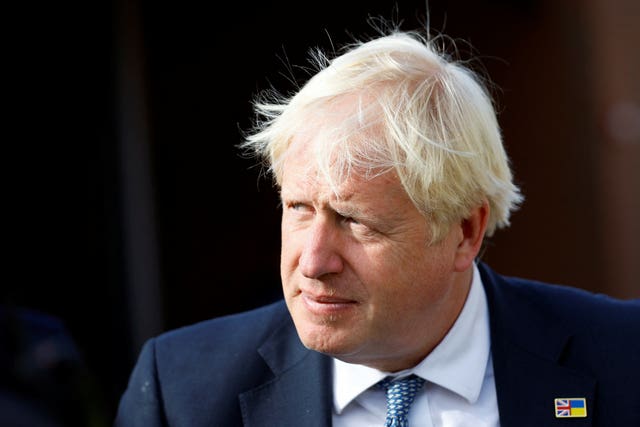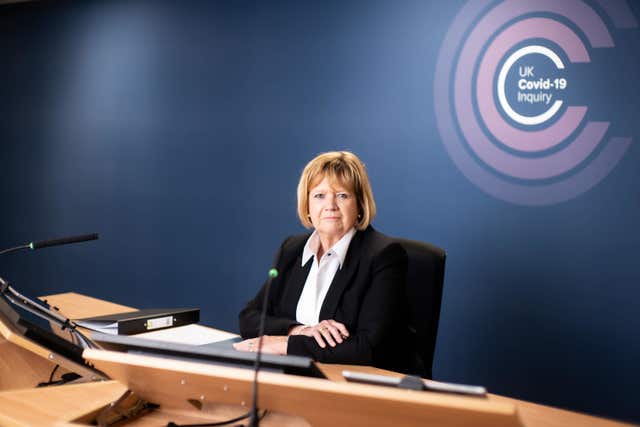
The Cabinet Office has been given until the end of the week to clarify its position on whether it is seeking to prevent the UK Covid-19 Inquiry from seeing Boris Johnson’s unredacted WhatsApp messages and notebooks.
In what proved a tense finale to Tuesday’s preliminary Covid hearing, chairwoman Baroness Hallett granted a request from the inquiry’s counsel for the Cabinet Office to “make their position plain” by Friday.
The retired senior judge also challenged the department on why it would want to redact information that former prime minister Mr Johnson has said he is happy to submit wholesale to the inquiry.
The clash is the latest development in a row between ministers and the inquiry over Lady Hallett’s request for Mr Johnson’s WhatsApp correspondence and notebooks from his time in Downing Street to be submitted.
The Cabinet Office is challenging the request in the High Court after Lady Hallett refused to withdraw the request, made under a Section 21 notice of the Inquiries Act.
It argues that some of the information requested by the inquiry does not relate to Covid and is “unambiguously irrelevant”.
With a High Court date set for June 30 at the earliest, counsel to the inquiry Hugo Keith KC suggested that the inquiry is likely to be able to inspect much of the contested material before the case is heard by judges due to the former Conservative Party leader offering to hand over the information directly and bypassing the Cabinet Office.
Mr Keith told Lady Hallett: “We will shortly gain access to all the material on an unredacted basis.”
He told the central London hearing that the inquiry’s legal team is seeking to inspect next week Mr Johnson’s WhatsApp messages dating from after May 2021.
It has also requested the Cabinet Office return Mr Johnson’s notebooks to him by June 12 to start a similar inspection process so it can “compare them to the redacted copies already provided by the Cabinet Office”.

Mr Keith said the same inspection could potentially be done with messages on a locked phone of Mr Johnson’s that he stopped using in May 2021 after security concerns were raised that his mobile number had been publicly available online for 15 years.
The phone is likely to contain conversations relating to the ordering of three lockdowns in 2020.
But Nicholas Chapman, representing the Cabinet Office, said the department “reserves its position” when it comes to potentially redacting information from Mr Johnson’s notebooks and WhatsApp discussions.
Mr Chapman said the Cabinet Office was “particularly cognisant of potential national security issues” and that it “reserves its position on whether unambiguously irrelevant material should be provided to the inquiry by any person in advance of the resolution of the judicial review”.
Lady Hallett, who told Mr Chapman he was “not the most popular brief today” before he offered his submission, challenged the lawyer about the Cabinet Office’s position.
The chairwoman asked: “The Cabinet Office is in possession of Mr Johnson’s notebooks.
“But because of the point that is going to judicial review, even though Mr Johnson himself has said he would reveal them to the inquiry without redaction, the Cabinet Office is going to apply redactions to somebody else’s material. Have I got that right?”
Mr Chapman replied: “The position is that the Cabinet Office is working out its position.”

Mr Keith said the Cabinet Office’s current stance “will not do” and called for the chairwoman to give the department a deadline by which it should state its position.
“They have had ample time to make their position plain and I would invite you to order that by the end of this week the Cabinet Office formally indicates what its position is,” he said.
Mr Keith said that clarification should include whether the inquiry would have unredacted access to Mr Johnson’s notebooks, his diaries and the WhatsApp messages on his locked mobile.
Lady Hallett granted the request, saying: “I make the directions that you seek, that I want those matters by the end of the week from Cabinet Office.”
The Government’s High Court challenge came under fierce criticism during the preliminary hearing, which was focused on Module 2 of the inquiry, which will look into core political and administrative decision-making by the UK Government.
Thalia Maragh, the counsel for bereaved families, said it “beggars belief” that the inquiry is dealing with the Cabinet Office legal action in the lead-up to next week’s first public evidence session.
“The families are deeply disappointed that the Cabinet Office is persisting with its legal challenge to your ruling, which the families see as a further step to interfere in the inquiry’s independence and to control the material it receives, and what it can and cannot see,” she told Lady Hallett.
Downing Street has said it is willing to look at other ways of resolving its disagreement with the inquiry over Mr Johnson’s messages to avoid going to court.


Comments: Our rules
We want our comments to be a lively and valuable part of our community - a place where readers can debate and engage with the most important local issues. The ability to comment on our stories is a privilege, not a right, however, and that privilege may be withdrawn if it is abused or misused.
Please report any comments that break our rules.
Read the rules here